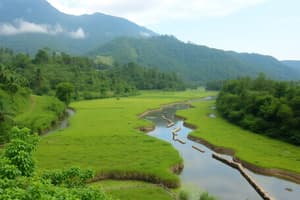Podcast
Questions and Answers
What is the role of producers in an ecosystem?
What is the role of producers in an ecosystem?
- Regulate population sizes of other organisms
- Produce organic matter using sunlight (correct)
- Consume other organisms for energy
- Break down dead matter
Which organisms are responsible for breaking down dead or decaying matter in an ecosystem?
Which organisms are responsible for breaking down dead or decaying matter in an ecosystem?
- Producers
- Decomposers (correct)
- Regulators
- Consumers
How do regulators contribute to maintaining balance in ecosystems?
How do regulators contribute to maintaining balance in ecosystems?
- Consume other organisms for energy
- Regulate population sizes of other organisms (correct)
- Break down dead matter
- Produce organic matter
Why does a high level of biodiversity strengthen the stability of ecosystems?
Why does a high level of biodiversity strengthen the stability of ecosystems?
Why does a high level of biodiversity maximize the use of available resources in an ecosystem?
Why does a high level of biodiversity maximize the use of available resources in an ecosystem?
How does a diverse ecosystem reduce vulnerability to diseases?
How does a diverse ecosystem reduce vulnerability to diseases?
What is one way increased biodiversity enhances soil quality?
What is one way increased biodiversity enhances soil quality?
How do ecosystems with a broad range of species cope better with environmental stressors?
How do ecosystems with a broad range of species cope better with environmental stressors?
Which human activity is causing the loss of countless species through the conversion of natural habitats?
Which human activity is causing the loss of countless species through the conversion of natural habitats?
What measure is being implemented to rebuild the health of damaged ecosystems?
What measure is being implemented to rebuild the health of damaged ecosystems?
Flashcards are hidden until you start studying
Study Notes
Exploring Biodiversity: A Focus on Ecosystems
Biodiversity, a term that encompasses the rich and varied life forms inhabiting Earth, is a crucial factor in maintaining healthy ecosystems. Ecosystems are intricate, dynamic networks that support the existence and interdependence of plant and animal species. Let's delve deeper into the significance of biodiversity in the context of ecosystems.
The Web of Life: Ecosystem Structure and Function
An ecosystem is a self-sustaining, interconnected community of living organisms and their environment. Each component in the ecosystem has a role to play, ensuring a harmonious balance. These components include:
-
Producers: Photosynthetic organisms, like plants, algae, and some bacteria, produce organic matter using sunlight. They form the base of the food chain and the foundation of all ecosystems.
-
Consumers: Herbivores, carnivores, and omnivores feed on producers and each other to obtain energy. Some organisms, like decomposers, break down dead matter and release nutrients back into the environment.
-
Decomposers: Bacteria, fungi, and other microorganisms break down dead or decaying matter, transforming it into nutrients that enrich the soil.
-
Regulators: Predators, parasites, and diseases regulate the population sizes of other organisms, preventing overpopulation and maintaining a balance.
The Value of Biodiversity in Ecosystems
A high level of biodiversity strengthens the resilience and stability of ecosystems. Some benefits include:
-
Greater resource efficiency: As each species in an ecosystem has a unique role, a high level of biodiversity maximizes the use of available resources.
-
Reduced vulnerability to diseases: A diverse ecosystem is less susceptible to the spread of diseases since various species are less likely to host the same pathogens.
-
Enhanced soil quality: A greater number of decomposers improve soil quality and promote plant growth.
-
Increased resistance to environmental stress: Ecosystems with a broad range of species are better equipped to cope and recover from environmental stressors, such as natural disasters and climate change.
The Threats to Biodiversity
Despite the importance of biodiversity, human activities are causing numerous threats to the health of ecosystems. Some of these threats include:
-
Habitat loss: The conversion of natural habitats to agricultural lands, urban areas, and other human infrastructure is causing the loss of countless species.
-
Pollution: Pollution from pesticides, plastic waste, and industrial byproducts is adversely affecting ecosystems, impacting the health and well-being of species.
-
Overexploitation: Overfishing, overhunting, and unsustainable resource extraction are depleting the populations of countless species.
-
Climate change: Rising temperatures, altered precipitation patterns, and other climate-related changes are causing the loss of species and disrupting the balance of ecosystems.
Conservation and Restoration Efforts
To preserve and restore the health of ecosystems, we must take action. The following measures are being implemented to conserve and restore biodiversity:
-
Protected areas: Governments and NGOs are establishing protected areas to preserve species and ecosystems, ensuring they remain unharmed by human activities.
-
Restoration programs: Governments and NGOs are implementing ecosystem restoration programs, such as tree planting, to rebuild the health of damaged ecosystems.
-
Sustainable resource management: Governments, businesses, and communities are adopting sustainable resource management practices to reduce their impact on ecosystems.
-
Climate change mitigation: Governments and communities are taking measures to reduce greenhouse gas emissions and to adapt to the impacts of climate change.
In conclusion, biodiversity is the cornerstone of healthy ecosystems. By taking action to conserve and restore biodiversity, we can ensure that our ecosystems remain resilient, vibrant, and capable of supporting life. For further information on biodiversity, ecosystems, and conservation efforts, explore the extensive resources available in the world of science and nature.
Studying That Suits You
Use AI to generate personalized quizzes and flashcards to suit your learning preferences.




